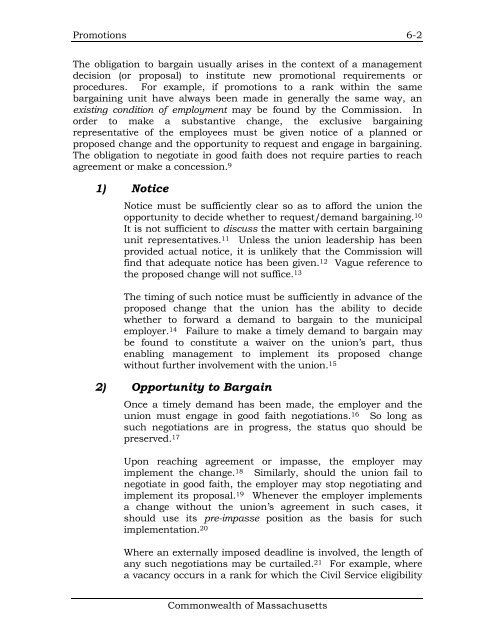Management Rights - AELE's Home Page
Management Rights - AELE's Home Page
Management Rights - AELE's Home Page
You also want an ePaper? Increase the reach of your titles
YUMPU automatically turns print PDFs into web optimized ePapers that Google loves.
Promotions 6-2<br />
The obligation to bargain usually arises in the context of a management<br />
decision (or proposal) to institute new promotional requirements or<br />
procedures. For example, if promotions to a rank within the same<br />
bargaining unit have always been made in generally the same way, an<br />
existing condition of employment may be found by the Commission. In<br />
order to make a substantive change, the exclusive bargaining<br />
representative of the employees must be given notice of a planned or<br />
proposed change and the opportunity to request and engage in bargaining.<br />
The obligation to negotiate in good faith does not require parties to reach<br />
agreement or make a concession. 9<br />
1) Notice<br />
Notice must be sufficiently clear so as to afford the union the<br />
opportunity to decide whether to request/demand bargaining. 10<br />
It is not sufficient to discuss the matter with certain bargaining<br />
unit representatives. 11 Unless the union leadership has been<br />
provided actual notice, it is unlikely that the Commission will<br />
find that adequate notice has been given. 12 Vague reference to<br />
the proposed change will not suffice. 13<br />
The timing of such notice must be sufficiently in advance of the<br />
proposed change that the union has the ability to decide<br />
whether to forward a demand to bargain to the municipal<br />
employer. 14 Failure to make a timely demand to bargain may<br />
be found to constitute a waiver on the union’s part, thus<br />
enabling management to implement its proposed change<br />
without further involvement with the union. 15<br />
2) Opportunity to Bargain<br />
Once a timely demand has been made, the employer and the<br />
union must engage in good faith negotiations. 16 So long as<br />
such negotiations are in progress, the status quo should be<br />
preserved. 17<br />
Upon reaching agreement or impasse, the employer may<br />
implement the change. 18 Similarly, should the union fail to<br />
negotiate in good faith, the employer may stop negotiating and<br />
implement its proposal. 19 Whenever the employer implements<br />
a change without the union’s agreement in such cases, it<br />
should use its pre-impasse position as the basis for such<br />
implementation. 20<br />
Where an externally imposed deadline is involved, the length of<br />
any such negotiations may be curtailed. 21 For example, where<br />
a vacancy occurs in a rank for which the Civil Service eligibility<br />
Commonwealth of Massachusetts
















